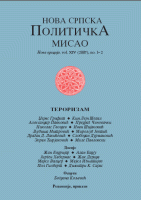Islamski radikalizam i teroristička pretnja u BiH
Islamic Radicalism and Terrorist Threat in Bosnia-Herzegovina
Author(s): Slobodan DurmanovićSubject(s): Politics / Political Sciences
Published by: Nova srpska politička misao
Keywords: Bosnia-Herzegovina; terrorism; Islam; Islamic Declaration; radicalism; revivalism; Wahabism;
Summary/Abstract: The author investigates the phenomenon of radical Islamism in Bosnia-Herzegovina in the context of contemporary definitions of Islamism. Starting with The Islamic Declaration by Alija Izetbegovi}, the author analyzes primarily theoretical assumptions and goes on to pre-war and war practice that led to the idea of an Islamic Bosnian state and encouraged growth of Muslim fundamentalism in Bosnia-Herzegovina. Revivalism tendencies, which emphasize the necessity of returning to the original path of Islam and building an Islamic identity of Bosnian Muslims started to flourish after the war. Specific examples are numerous influential organizations such as the Vizier, Furkhan, AIO and others, which state that their particular aim is to make Bosnia-Herzegovina a Shariah and Islamic values oriented state. These “charities” focus on religious education of youth and enjoys strong support among poverty-stricken Muslim population, and sometimes even among higher social strata. The author argues that the situation has become more radical since September 11th and anti-terrorist investigations led in USA along with the increased number of reports on war, financial and ideological connections of “holy warriors” and representatives of Islamic “charities” in Bosnia-Herzegovina with Panislamistic organizations throughout the world. An additional problem is the fact that the Islamic Community of Bosnia-Herzegovina does not condemn Wahabism, which was formally revealed in the Addenda of the Riyaset of the Islamic Community. Being able to act without impediments, Wahabism, which represents an ideological platform for terrorism, has a constant increase in the number of followers and is more likely to take its cue from organizations such as Hamas. The problem of the growing terrorist threat in Bosnia- Herzegovina is further exacerbated by inspiring the sense of frustration and the assertion that Bosnian Muslims were subject to genocide in the Bosnian war. There are no significant differences among radical and moderate Bosnian Islamists on that issue and prospects for breaking up with radicalism are small. The author concludes that the process of suppressing Islamic fundamentalism is a necessary prerequisite for making a stable multireligious society in Bosnia-Herzegovina, important for the stability of the entire region, as well as for the safety of the EU.
Journal: Nova srpska politička misao
- Issue Year: 14/2007
- Issue No: 01+02
- Page Range: 157-183
- Page Count: 26
- Language: Serbian
- Content File-PDF

